
Heinrich Wilhelm "Heinz" Rühmann was a German film actor who appeared in over 100 films between 1926 and 1993. He is one of the most famous and popular German actors of the 20th century, and is considered a German film legend. Rühmann is best known for playing the part of a comic ordinary citizen in film comedies such as Three from the Filling Station and The Punch Bowl. During his later years, he was also a respected character actor in films such as The Captain from Köpenick and It Happened in Broad Daylight. His only English-speaking movie was the 1965 Ship of Fools.

The Captain from Köpenick is a 1931 German comedy film directed by Richard Oswald and produced by Gabriel Pascal. It is one of several films based on the 1931 play of the same name by Carl Zuckmayer. The story centers on the Hauptmann von Köpenick affair in 1906.
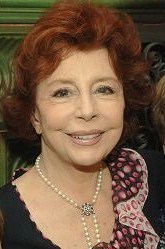
Sonja Alice Selma Toni Ziemann was a German film and television actress. In the 1950s, she was among Germany's most prominent actresses, awarded the 1950 Bambi for appearing, together with Rudolf Prack, in Schwarzwaldmädel. From the 1960s, she turned to more serious acting in international films such as The Secret Ways. She played in several anti-war films such as Strafbataillon 999. She also appeared on stage and in television.

Karin Hardt Meta Therese was a German actress.
Erich John Waschneck was a German cameraman, director, screenwriter, and film producer.

Scandal at the Fledermaus is a 1936 German comedy film directed by Herbert Selpin and starring Viktor de Kowa, Maria Andergast and Adele Sandrock. It was shot at the Terra Studios in Berlin. The film's sets were designed by the art director Erich Czerwonski. It was partly shot on location in London. It is also known by the alternative title Scandal Over Mary.
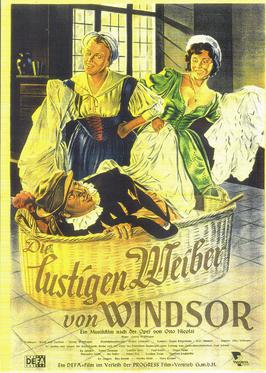
The Merry Wives of Windsor is a 1950 East German musical comedy film directed by Georg Wildhagen. It was based on William Shakespeare's play by the same name.

Gunnar Möller was a German television and film actor. He appeared in over 160 film and television productions between 1940 and 2016. He was most successful as a leading man in German cinema of the 1950s, especially with his role in I Often Think of Piroschka (1955) with Liselotte Pulver. He later turned to character roles and worked for a number of years in England, including the supporting role of Hans van Broecken in World War II drama series Secret Army.
Ernst von Klipstein was a German film and television actor. von Klipstein became a prominent actor during the Nazi era, appearing in a large number of action films.
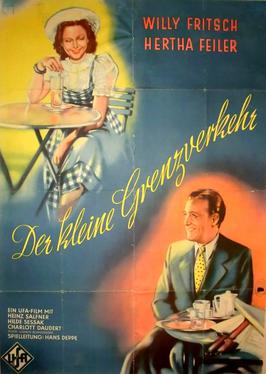
A Salzburg Comedy or Little Border Traffic is a 1943 German comedy film directed by Hans Deppe and starring Willy Fritsch, Hertha Feiler and Heinz Salfner. Erich Kästner wrote the screenplay based on one of his own novels. As he had been blacklisted by the Nazi Party, he used the pseudonym Berhold Bürger. The novel was again adapted for the 1957 film Salzburg Stories.
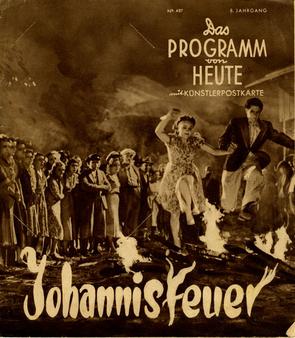
Midsummer Night's Fire or St. John's Fire is a 1939 German drama film directed by Arthur Maria Rabenalt and starring Anna Dammann, Ernst von Klipstein, and Gertrud Meyen. The film is based on the play Fires of St. John by Hermann Sudermann. The title refers to Saint John's Eve.

At the Well in Front of the Gate is a 1952 West German romance film directed by Hans Wolff and starring Sonja Ziemann, Hans Stüwe and Paul Klinger. It was shot in Agfacolor at the Tempelhof Studios in West Berlin and on location around Dinkelsbühl in Bavaria. The film's sets were designed by the art directors Willi A. Herrmann, Heinrich Weidemann and Peter Schlewski.
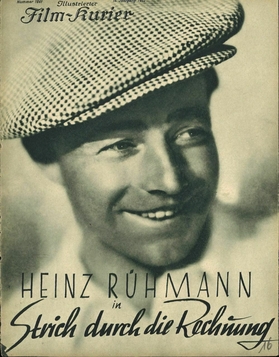
Spoiling the Game is a 1932 German comedy film directed by Alfred Zeisler and starring Heinz Rühmann, Toni van Eyck, and Hermann Speelmans. Its hero is a young cyclist who enters a race.

Tell the Truth is a 1946 German comedy film directed by Helmut Weiss and starring Gustav Fröhlich, Mady Rahl, and Ingeborg von Kusserow. The film had a troubled production, and was originally filming in the final days of the Nazi era with Heinz Rühmann and his wife Hertha Feiler in the lead roles. Production was halted when Soviet forces took control of the Tempelhof Studios during the Battle of Berlin. The film was then remade in the British sector of Berlin with different leads but using substantial amounts of footage already shot during the previous production.
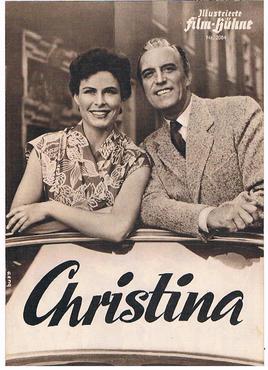
Christina is a 1953 West German drama film directed by Fritz Eichler and starring Barbara Rütting, Lutz Moik and Franziska Kinz. It was shot at the Tempelhof Studios in West Berlin. The film's sets were designed by the art director Wilhelm Vorwerg.

One Night Apart is a 1950 West German period comedy film directed by Hans Deppe and starring Kurt Seifert, Olga Chekhova and Sonja Ziemann. It was shot at the Tempelhof Studios in Berlin. The film's sets were designed by the art director Gabriel Pellon.

My Wife's Friends is a 1949 West German comedy film directed by Hans Deppe and starring Sonja Ziemann, Grethe Weiser and Gerda Maurus. It was made by Real Film at the Wandsbek Studios in Hamburg. The film's sets were designed by the art directors Herbert Kirchhoff and Mathias Matthies.
Love's Awakening is a 1936 German drama film directed by Herbert Maisch and starring Eugen Klöpfer, Karin Hardt and Hans Schlenck. It was shot at the Marienfelde Studios of Terra Film in Berlin.
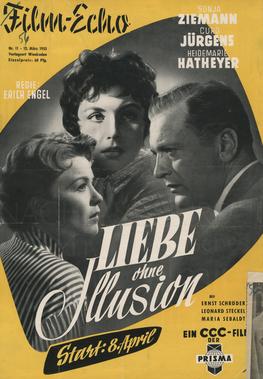
Love Without Illusions is a 1955 West German drama film directed by Erich Engel and starring Sonja Ziemann, Curd Jürgens and Heidemarie Hatheyer.
















